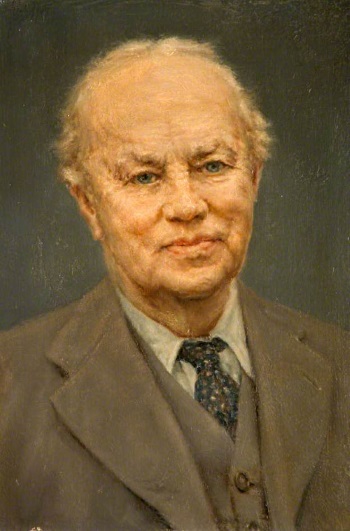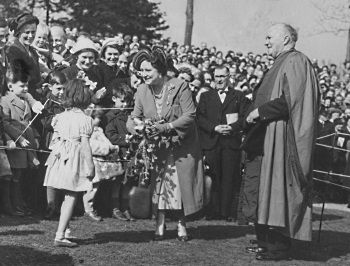Lord Lindsay and the Election of 1938
Lord Lindsay
 The founding Principal of Keele University (as the University College of North Staffordshire) was Alexander Dunlop Lindsay, 1st Baron Lindsay of Birker CBE (1879-1952). He was known to his friends as Sandie Lindsay and to Keele as Lord Lindsay.
The founding Principal of Keele University (as the University College of North Staffordshire) was Alexander Dunlop Lindsay, 1st Baron Lindsay of Birker CBE (1879-1952). He was known to his friends as Sandie Lindsay and to Keele as Lord Lindsay.
He was Master of Balliol College, Oxford 1924-1949, Vice-Chancellor of Oxford University from 1935-1938 and the founding Principal of the University College of North Staffordshire - now Keele University - from 1949 to 1952.
Lindsay was educated from 1887 at the Glasgow Academy, then at the University of Glasgow, where he gained a Master of Arts degree in 1899, and lastly at University College, Oxford, where he took a Double First in 1902. Sandie Lindsay began his academic career as an assistant lecturer in philosophy at the Victoria University of Manchester from 1904–1906 and was then elected a fellow and tutor in philosophy at Balliol College, Oxford. He became Professor of Moral Philosophy at the University of Glasgow in 1922 and then in 1924, he became Master of Balliol College and Vice-Chancellor of the University of Oxford from 1935-1938, making him one of the leading academics of his day.
Lindsay was a prominent figure in the adult education movement and had been deeply involved with the Workers’ Educational Association in his younger days. Lindsay was a strong advocate of working-class adult education, and had suggested a "people's university" in an address to the North Staffordshire Workers' Educational Association as early as 1925. On his retirement from Balliol in 1949, Lindsay was able to apply his lifelong principles and educational philosophy to found a new and experimental University at Keele.
This portrait of Lindsay hangs in Keele Hall.
The 1938 Oxford by-election
Alongside his academic accomplishments, one unusual incident in Lindsay’s life stands out. It is comparatively rare for academics to become actively involved in politics but, in 1938, Lindsay stood for Parliament in the Oxford by-election. As the first confessed socialist to head a college in Oxford, he was regarded as a dangerous revolutionary by many of his colleagues, particularly when he stood as the Popular Front candidate in the by-election. His single manifesto issue was opposition to the Munich Agreement. This settlement had permitted Nazi Germany to annex the German-speaking parts of Czechoslovakia known as the "Sudetenland". The agreement is widely regarded as the last failed act of appeasement toward Nazi Germany.
 The Liberal Party and Labour Party candidates agreed to stand down in order to support Lindsay as an Independent Progressive candidate. The Conservatives selected the prominent Quintin Hogg as their candidate but Lindsay still drew support from many Conservatives including Roy Jenkins and future Prime Ministers Winston Churchill, Harold Macmillan and Edward Heath. The future Labour Prime Minister Harold Wilson also backed Lindsay from the Labour party. The campaign was intense and focused almost entirely on foreign affairs and attitudes to the rise and expansion of Nazi Germany. Hogg supported the appeasement policy. Lindsay opposed appeasement, using the slogan "A vote for Hogg is a vote for Hitler." The campaign provoked heated debate about the policy of appeasement. The turnout rose from 67.3% at the previous election to 76.3%. Hogg won the seat but with a much-reduced majority.
The Liberal Party and Labour Party candidates agreed to stand down in order to support Lindsay as an Independent Progressive candidate. The Conservatives selected the prominent Quintin Hogg as their candidate but Lindsay still drew support from many Conservatives including Roy Jenkins and future Prime Ministers Winston Churchill, Harold Macmillan and Edward Heath. The future Labour Prime Minister Harold Wilson also backed Lindsay from the Labour party. The campaign was intense and focused almost entirely on foreign affairs and attitudes to the rise and expansion of Nazi Germany. Hogg supported the appeasement policy. Lindsay opposed appeasement, using the slogan "A vote for Hogg is a vote for Hitler." The campaign provoked heated debate about the policy of appeasement. The turnout rose from 67.3% at the previous election to 76.3%. Hogg won the seat but with a much-reduced majority.
Photo right: Her Majesty The Queen and Lindsay at the official opening of the University College of North Staffordshire in 1951.
The vigorous airing of views for and against appeasement during the by-election had a great influence on public opinion nationwide. The abhorrence of war engendered by the Great War, which had ended after catastrophic casualties just twenty years earlier, led many to strive for the avoidance of another great European War at any price. However, from the time of the Oxford by-election onwards, voices advocating opposition to Hitler’s aggressive expansionism grew louder and preparations for an inevitable war were accelerated. Lindsay’s by-election is seen by many as an important step in Britain’s preparations to enter the War in 1939 to defend Poland against Nazi aggression.
The 1988 TV drama-documentary "A Vote for Hitler" dramatised the events surrounding the by-election. The actor John Woodvine played Lindsay.
More about Lindsay
During the First World War Lindsay served in the British Army as Lieutenant-Colonel and in 1917 became deputy controller of labour in France. He and was twice mentioned in dispatches. Lindsay became a national figure in 1926 when he joined with William Temple in urging the government to seek a negotiated agreement to the General Strike. One of his students, Christopher Hill, later argued: "His influence on students between the two world war wars was incalculable, and time and time again he gave a lead where few others in university circles did - in attempting reconciliation during the general strike." An educational adviser to the Labour Party, Lindsay was chairman of the National Council of Social Service. On the outbreak of the Second World War Lindsay became chairman of the Joint Recruiting Board, with the task of allocating conscientious objectors to work of national importance other than military service. He also played an important role in organizing education for the armed forces.
As well as being a regular contributor to the Manchester Guardian he wrote several books including The Philosophy of Bergson (1911), The Philosophy of Immanuel Kant (1913), The Essentials of Democracy (1929), Kant (1934), The Modern Democratic State (1943) and Religion, Science and Society in the Modern World (1943).
He was elevated to the peerage by Clement Attlee on 13 November 1945 as Baron Lindsay of Birker, of Low Ground in the County of Cumberland.
There is a collection of Lindsay Papers in the University Library.
Lindsay Sightings
"St Catherine’s Church is several hundred yards outside Boot in Eskdale. My wife and I went into the churchyard to reflect on all the gravestones with familiar surnames from her ancestry, when I found myself looking at a grave with a name that was familiar for entirely different reasons – Lord Lindsay of Birker, first Principal of the University College of North Staffordshire, as it says on his tombstone – it’s a flat tablet to the rear and north west of the church, and alongside it are two headstones shoulder to shoulder. It is very close to his home, Low Ground, on Birker Fell, and we were amused to read later that day that he had been elevated to the peerage the day my wife was born. I remember his grandson, the current 3rd Baron, was at Keele in my day, probably 1966/7 as a post-graduate student living appropriately in one of the Lindsay blocks. St. Catherine’s is a delightful spot to spend eternity. If you are in Eskdale, do call in and pay your respects."
Ian Cameron (1967)
"This somehow reminded me of the phone call I had before I retired (2009) from Keele from a US graduate student who said she was doing a research paper on Lord Lindsay, and could she talk to me about my 1960s experiences of living in Keele. Could we meet up that very day? She said she was outside the Students Union. Walking over however I could see no such person. I called her back. She insisted she was outside the SU. Impasse, until she described her surroundings and I realised she was in Oxford, not Keele. She thought Keele was an Oxford College. It seemed someone in the university had told he considered Keele under Lindsay to be the ultimate Oxford college, so she thought it really was in Oxford!"
Steve Mills (1971)

